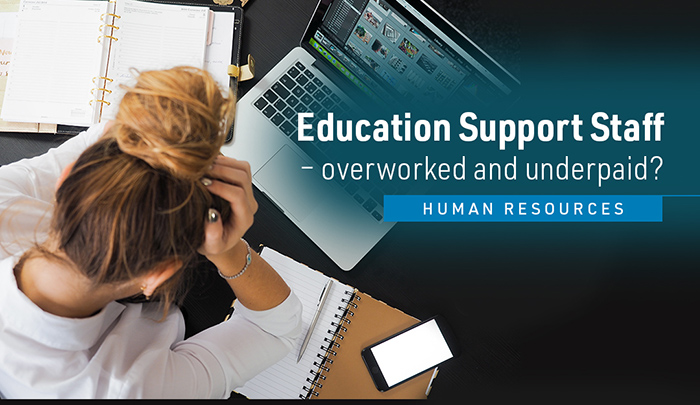Education Support Staff – are you overworked and underpaid?

One of the most important ongoing matters raised by IEU members is classification of Education Support Staff (also known as ESOs, SSOs and LSOs).
When the IEU conducts classification professional learning sessions for ESOs in-house, we typically receive questions such as:
- I am really overworked and I’m having to work extra hours that I’m not getting paid for;
- I’m having to supervise students and other staff and I don’t know whether I should be;
- I just keep getting more and more things that I am expected to do, or;
- when I think of what I am expected to do compared with others I don’t think I’m getting paid fairly.
Put simply, the answer to all these questions comes down to the grade or level at which the member is classified.
Is it a classification or workload issue?
Whilst ESOs might feel they have too much work, that is not what classification is about—that is a workload issue and needs to be tackled as such.
Classification covers:
- the level of technical expertise the staff member has (including formal qualifications);
- the level of responsibility they have in their role;
- the amount of, or lack of, supervision;
- the level of accountability; and,
- the level to which they are able or required to exercise judgement in the way they execute their role.
The classification structure and indicative duties that are part of each school’s Enterprise Agreement (EA) should provide clarification for these areas and (in most cases) give the member a good idea of their classification level.
Once this has been considered, if the member feels that they are incorrectly classified (generally that means under classified) then the next step to addressing this is to make sure that their duty statement is up-to-date.
Is your duty statement up-to-date?
When asked this question during our professional learning sessions, many ESOs realise that their duty statement (Position Information Document – PID) hasn’t been reviewed for a number of years and over that time their role may have changed significantly.
What can you do if your PID isn’t current?
If this is the case for you, we recommend you draft your own updated duty statement to reflect what you are actually doing. Once complete, a meeting with your line manager should be arranged to discuss your actual role versus your current PID.
After meeting with your line manager, if you still feel that you are under classified, a written application for a reclassification can be submitted to the line manager. In the majority of school EAs, management are required to respond to such an application within three weeks. The IEU can assist you with this process.
If the reclassification as requested is agreed, the appropriate salary for the new classification level should be backdated to the date of application. If the application is rejected there is an appeal process in your school EA to review the decision.
Contact our office if you have any questions relating to classification or need assistance – 8410 0122 or enquiries@ieusa.org.au

